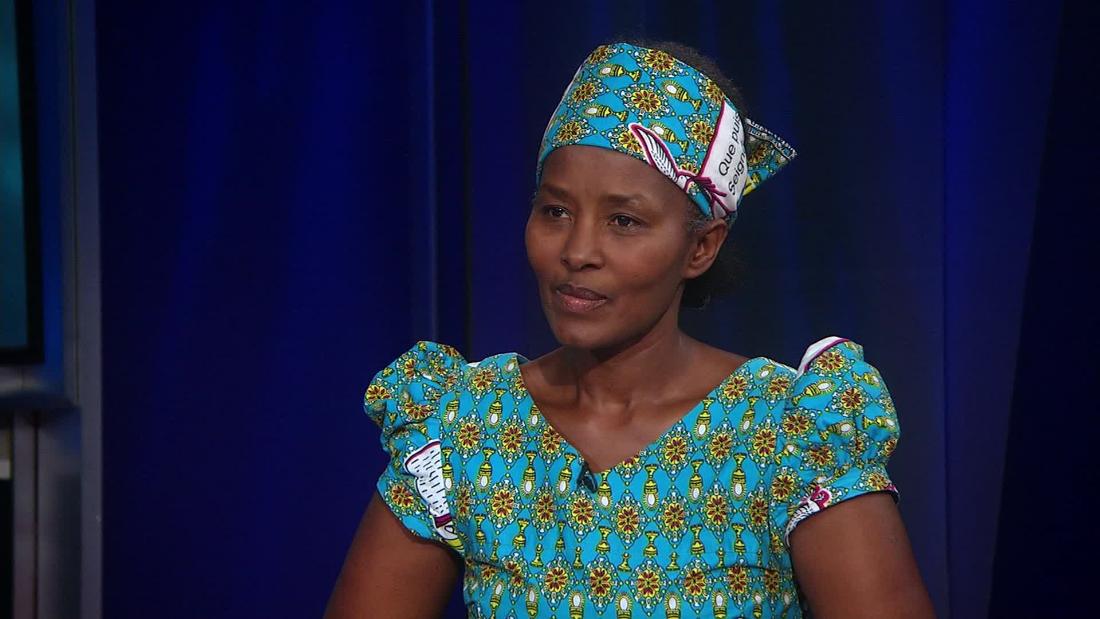
While a quarter of a century has passed since the Rwanda genocide, it feels like yesterday for survivors.
"I breathed in the blood," Uwimana told CNN's Christiane Amanpour in an interview airing Friday.
It was April 16th, 1994. Ten days earlier, President Juvenal Habyarimana's plane was shot down, ending the cease-fire in Rwanda's civil war and igniting 100 days of slaughter.
Hutu extremists targeted the minority ethnic Tutsis and other moderate Hutus, murdering between 800,000 and a million people, with clubs, machetes, and their bare hands. Neighbors turned on neighbors. Husbands turned on wives. Churches became abattoirs and schools became graveyards. Not even the young were spared.
'Angels sent from God'
"Not every Hutu wanted us dead" Uwimana wrote in her memoir 'From Red Earth,', "I knew my children and I would have been dead many times over, had it not been for my few Hutu friends watching over us."
Uwimana says she gave birth under the protection of a Hutu neighbor. Cutting the umbilical cord with a dirty knife, her Hutu friend pleaded with the Hutu mayor to let them take Uwimana and her children to the village's health clinic. The clinic became a refuge for Tutsis, with Hutu friends bringing them food, warning of danger, and taking Uwimana's baby to get vaccinated.
"I had unexpected support from Hutus," she told Amanpour. "Some of my neighbors whom I did not expect that they [would be] the ones to support me."
"They were like angels sent from God."
'I don't know where they put him'
Uwimana's newborn son -- now celebrating his 25th birthday - never met his father, Charles, who was not with the family during the time of the attack.
"I know he was killed by the Hutu militias, but I don't know where they put him."
"This is still a trauma for us."
Asked if she ever expected to be widowed at 29 years old, Uwimana replied, "never."
"I was dreaming of many good things with my husband. So suddenly, all were cut."
The last time she saw her husband was on April 5th, 1994.
"He just embraced me, he told me I love you, and he went."
'I told God: You disappoint me'
On Uwimana's mother's side, most of her relatives were killed in their place of worship. A number of churches became scenes of mass killings during the genocide, set alight with hundreds locked inside.
Over 90% of Rwanda is Christian, the majority Catholic. Hundreds of hundreds of priests and nuns were killed in the genocide. But others were active participants. In 2017, Pope Francis apologized for the "sins and failings of the church and its members" during the genocide. Several priests and nuns have been charged for their actions during the genocide.
Uwimana, a Protestant, described her struggle with faith as a deep trauma.
"I could not believe that people who believed [in] God, who were called Christians, were involved, directly or indirectly," Uwimana said. "I told God "You disappointed me."
'Rwanda is a family again'
Yet it was her faith that forged her journey of forgiveness. Uwimana found strength in a bible: a need to end the hate to find peace.
"[I had to] give chance [to] these Hutu people who killed, so that they recognize that they have done bad."
Since the genocide, Uwimana has dedicated herself to protesting any implication that any person or group is less human than another. She founded Iriba Shalom International, a non-profit helping genocide survivors find forgiveness and reconciliation.
On Sunday, at a memorial marking the 25th anniversary of the Rwandan genocide, President Paul Kagame reflected on such reconciliation "in 1994, there was no hope, only darkness, Today, light radiates from this place... Rwanda became a family once again."
Bagikan Berita Ini














0 Response to "Rwanda genocide survivor: 'Not every Hutu wanted us dead'"
Post a Comment